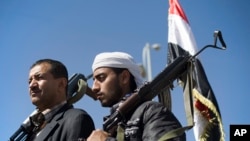Yemen's powerful Shi'ite rebels finalized their takeover of the country Friday, announcing they have dissolved parliament and are establishing a new presidential council to run Yemeni affairs.
In a televised statement, a Houthi spokesman said the old parliament was no longer legitimate.
He said that the [Houthi's] revolutionary committee will chose an interim national assembly, replacing the old parliament, which he claimed did not fairly represent the country. He added that members of the old body may join the new one.
The spokesman said the new 551-members assembly would chose a five member presidential council to govern the county, to replace former president Abd Rabbuh Mansour Hadi for an interim period.
Houthi rebel supporters released barrages of fireworks across the Yemeni capital Sana'a Friday evening to celebrate the announcement that the country's old political institutions were being dissolved. Houthi opponents are calling the development a “coup.”
Yemen has been mired in political turmoil for months, in addition to instability caused by the al-Qaida branch in the country. The Houthis stormed Yemen's capital in September after routing several Yemeni Army brigades.
Last month, Houthi rebels took over the residence of President Abd Rabbuh Mansour Hadi, prompting him and his Cabinet to resign.
Hadi officially submitted his resignation several days later, saying he was no longer able to perform his presidential duties.
It was not immediately clear how Yemen's longtime strongman and former president Ali Abdallah Saleh would react to the Houthi announcement. Several commentators on Arab media said they expected him to oppose the move.
The United Nations expressed concern Friday over the “deep political divisions” in Yemen.
In New York, a spokesman for United Nations Secretary-General Ban Ki-moon said the U.N. chief is greatly concerned by what he called Yemen's power vacuum.
A U.N. special envoy, Jamal Ben Omar, had been trying to conduct political negotiations to resolve the current conflict peacefully.
The failure of a truce between the Houthi militia and the government of the U.S.-backed Hadi sparked reports that Washington would suspend counterterrorism operations in Yemen until the situation stabilized.
Despite the political crisis, President Barack Obama vowed there would be no let-up, saying the United States would continue to pursue "high value targets inside Yemen."
This week, the Yemen branch of al-Qaida said one of its top commanders, Harith al-Nadhari, was killed in a U.S. air strike in the country's south.
The group, Al-Qaida in the Arabian Peninsula, claimed responsibility for the deadly terror attacks in Paris last month and has vowed to carry out similar ones ones in the future.
The U.S. considers AQAP al-Qaida's most dangerous offshoot.




